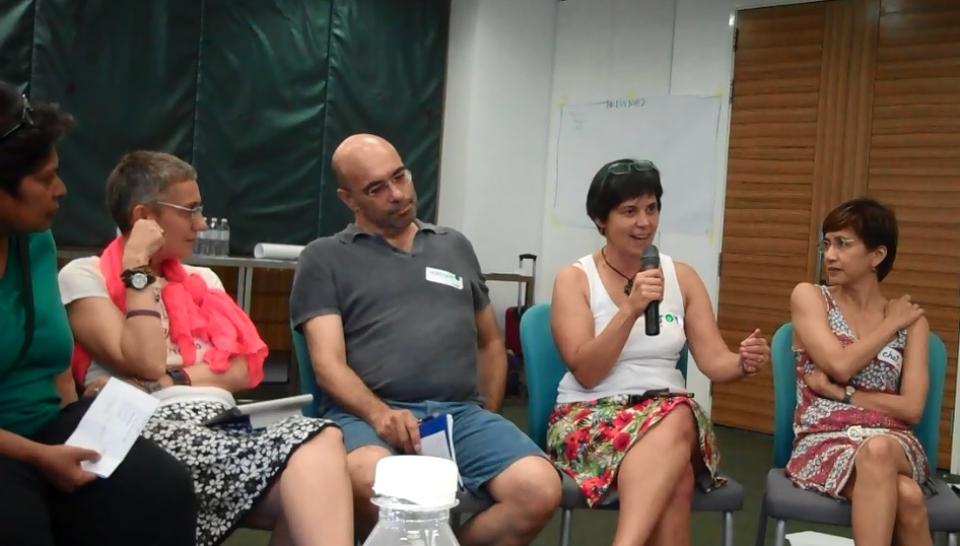
During the first day of the Global Meeting on Gender, Sexuality and the Internet which ocurred in Port Dickson, Malaysia, to explore the collective understanding of what a feminist internet looks like, a panel on “Power, politics and agency” took place with the participation of Chat Garcia Ramilo from the Philippines, Joy Liddicoat from New Zealand, Horacio Sívori from Brazil, Valentina Pellizer from Bosnia-Herzegovina, Bishakha Datta from India, and Sheena Magenya from Kenya.
Question: Has the internet in any way shifted structures of power? (government, religion, education, democracy) specially for women?
Chat: Specially when we reflect on the idea of milestones, and when we started advocating around the use of internet for women, it was about changing barriers for women: Giving voice and articulating oneself, from an organisational perspective, and aiding in organising and finding power in terms of networking. In governance, it’s more about participating, opening up more spaces for having a voice around decision making.
Panel on “Power, Politics and Agency” to #imagineafeministinternet: Chat Garcia Ramilo, APC Deputy Executive Director from APC on Vimeo.
Question: Will the internet enable rural women to participate in democracy in a more direct way. Is that really happening or true?
Bishakha: It’s a trick question where you can’t say yes or no. Intiially, we say that in countries like India there are huge problems with electricity, literacy, etc. But India also has a very high number of cellphone users, and the interesting thing is that everyone has heard of the internet, and wants access. People in rural areas recognise that they are being left behind. In Khabar Lahiriya workshops – they really took to all the things we use online, and figured out how to make it work for their activism. There is an aspiration, but don’t know if it can ever be fully met unless we remove some of those access barriers.
Panel on “Power, Politics and Agency” to #imagineafeministinternet: Bishakha Datta, Executive Director of Point of View from APC on Vimeo.
Question: But has it actually changed the notion of democracy itself? We used to have an idea about how democracy was supposed to work
Joy: On one hand, we fought for women’s vote, not because we just wanted to be equal in terms of participation, but because we have something to say – about our lives, about transforming them, and the communities we share. Online a lot of that got blown apart, because there was no system of governance in which we could talk about democracy and what that means – multistakeholder model. But actually, it’s not all the same. So we’re left with some deep questions about what it means to have spaces that seem like they are democratic, on the face of it, but don’t actually facilitate change.
Panel on “Power, Politics and Agency” to #imagineafeministinternet: Joy Liddicoat, APC Internet Rights coordinator from APC on Vimeo.
Question: In terms of uses of Facebook, for example how do we shape the rules that shape our lives? In an offline democratic space, we can vote.
Bishakha: Offline we always think of the vote as a measure of democracy. In India, they tested three electronic voting machines, and they had all been rigged. And the votes all went to one party. And for another, they put papers under some parties so you just couldn’t work. We always think that offline tech works for democracy, but even that gets skewed. While the net hasn’t transformed online relationships, its taken vote as the marker and made voice the marker.
Question: Has the internet taken the idea of votes and turned it into voice? What happens for instance with crowdsourcing, or likes on YouTube?
Sheena: Even before we get there, I’m always reluctant to speak for an African voice. So, in East and Southern Africa, the issue of access is always a big thing. So if you can access the internet – and access is often influenced by your power and privilege – even women with power and privilege, that’s not their struggle. The need to push for that kind of change is minimal. Their struggles are different from women who do need proper mobilisation and action.
Intervention: What about the challenge of the privacy movement, and new tools that allow us to opt out and choose platforms and tools that are more in line with protecting our rights. Can we not see this as a challenge to that power?*
Joy: This retreat into private space is problematic, retreating from the public space. We can organise and hide, but it will be seen as a retreat.
Panel on “Power, Politics and Agency” to #imagineafeministinternet: Is opting out a challenge to power? from APC on Vimeo.
Question: Is this simply about exercising our rights as a consumer in a globalised, commodified space?
Valentina: Why does there have to be only one internet? I want a private space that is safe and secure and I can set the rules, where I can strategise. I don’t want to be held hostage to Facebook. We have to highlight complexity, and if there are alternative internets. Even if I am there to vote, who decides the rules of voting? I was not asked, and I don’t want to play by those rules. I don’t always have to be immersed and pushed to think at their pace.
Chat: As a strategy, there are times when you have to disengage because it is an unsafe space. But it doesn’t have to be a retreat. It can be a powerful act when it is an intentional act, when you know why you are disengaging. For example, when you are being attacked.
Question: Has the internet created new sites for organising, or is it even worse, because all activism is happening on Facebook?
Intervention: In terms of the internet, and in the context of groups of sex workers in South Africa, the internet is a privilege. After wanting sex workers to engage with the community on Twitter, it was surprising that they didn’t have Twitter, or Facebook. For them, the internet may have made it better for getting clients, but not true for others. It depends on where you come from and the kinds of privilege you have. For organising it might help, but most of the people who like the page and engage with them are not sex workers, they are activists. It’s difficult to suss out if it’s really helping with this work.
Bishakha: If we take the example of sex workers forward, what’s very interesting is that you’re seeing two kinds of things: Recently Amnesty International put out a policy to support the decriminalisation of sex work in the world. The biggest platform this battle was fought on was Twitter. Some sex workers who are educated and have access can participate, but in countries like India, the vast majority cannot participate. Hashtag #realjobsnotblowjobs. Ten years ago, this same debate was happening offline. Organisations were sent emails saying that Amnesty should be supported on Twitter. In India, all sex workers have cell phones. And maybe one of the larger conversations is do we want to think about gender, sexuality and digitality? We broaden the space. The second example is about people who are disabled. We see from anecdotal evidence that WWD use the internet to explore their sexuality. In a sense, you can erase the disabling aspects of the body. But do we want to tell people that you have to hide who you are to explore your sexuality, or be able to tell people to be who they are to enjoy their sexuality.
Panel on “Power, Politics and Agency” to #imagineafeministinternet: Bishakha Datta, executive Director, Point of View from APC on Vimeo.
Question: Has the internet helped in the decisions we make about our bodies?
Intervention: I run a blog called Adventures from the bedrooms of African women, where individual African women contribute their own stories. It is helpful to have a space where people can talk freely. Also where people are able to negotiate for more pleasurable sex.
Question: Has the internet played a role in subverting the heterosexist, patriarchal system?*
Horacio: Anonymity plus interactivity – has it produced a politicisation or depoliticisation in relation to our bodies, desires and identities? Going to older feminist and gay movements of politicising sex. An example is shifting our focus from activism to everyday life and pleasure, and desire, and hooking up. Homosexually oriented men who want to have sex with men, and meet on the internet, I am thinking how through digital technologies this has gotten organised like a market. Some hegemonic cultural values are organising that market, and how discriminatory, sexist and patriarchal these spaces can be. And how our desire is organised by those values.
Valentina: Today we said that the women’s movement was focusing on relationships and communication. The internet is a tool. So my body, when I click on Facebook, my images and fantasies are exploited. Even when I self-censor, there is someone who monitors and watches why I self-censor. There is a memory of myself that goes beyond my own memory. It took us a long time to enter the world of the internet and say it was our space, then we enjoyed it, but now we need to reclaim the space, the politics of it. The intuitive feminism – creative selfies for example – is then commodified by certain hegemonic forces to be sold, for increasing adverts, etc.
Joy: The last twenty years has allowed us to see our bodies as never before. Children, from the moment they were conceived, are photographed and published. I think it will be interesting to see how they perceive their bodies, perhaps as separate from themselves. What the internet has done is taken our rights outside our bodies. People thought it was only about freedom of expression. But as we take our bodies onto the internet, we advocate for bodily rights (not just sexual rights).
Sheena: The black African woman’s body is largely absent on the internet. Google babies and the first ten pages is blonde babies. The first black babies are starving, malnutritioned. How people perceive African women’s bodies. When you Google African woman, you get the African American Woman stock photo. We don’t have her body to begin with. What the lived realities are for African identified women on the internet?
Panel on “Power, Politics and Agency” to #imagineafeministinternet: Sheena Magenya, Coalition of African Lesbians from APC on Vimeo.
Question: Who has access to the internet, and whose bodies are occupying the spaces on the internet?
Siwar Masannat: Almost impossible to not talk about access in terms of representation. What’s interesting is that the internet allows us to create contexts, but the contexts that we are creating end up being patriarchal or stereotypical. If we need to work on access, we need to also monitor contexts, especially within women’s and LGBTQ spaces, which are more inclusive.
- 7803 views






Add new comment